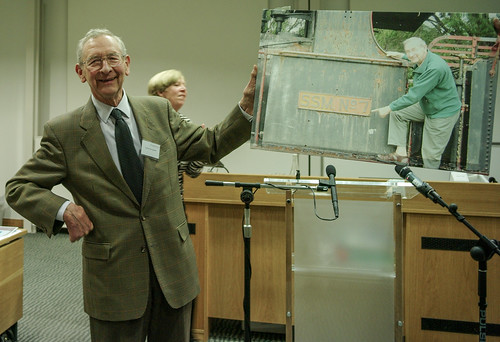Last Friday, I went to Lancaster to take part in a symposium organised by the Lancaster University Management School to honour my friend and mentor, Professor Peter Checkland (seen here with a photograph of himself inspecting an ancient Indian locomotive). It was a stimulating, intriguing and enjoyable event. The pdf of my contribution is available here. (It explains the enigmatic heading over this post, btw.)
Daily Archives: April 24, 2012
The dish best eaten cold
Lovely piece by Professor Mary Beard, responding to the sneering of the Sunday Times‘s TV ‘critic’, one A.A. Gill, who focussed on her appearance rather than on her TV programmes, Meet the Romans.
So what of my revenge?
First, I’d like to invite him to a tutorial in my study at Cambridge and ask him to justify and substantiate his opinions. We could talk them through. Possibly then he would learn a little about the crass assumptions he’s making and why they don’t amount to anything more.
Next, for my Roman-style revenge on Gill, I’d force him to watch each of my programmes from start to finish. And to ensure he did so with appropriate diligence, I’d ask Clare [Balding — a BBC sports commentator who has also been abused by Gill on account of her appearance] to be on hand to enforce the penalty.
And as Gill is also a food critic —and I’m certain there is a veritable battalion of angry chefs and restaurateurs who would gladly volunteer to help with this bit — I’d force-feed him, like a goose destined for pate de foie gras, his least favourite dishes, while he sat and learned about the Romans.
And then we’d talk about them — and I mean about their substance, not just about my lack of lipgloss.
According to Wikipedia, Gill is a “recovered alcoholic” and has acute dyslexia, which means that all his ‘writing’ is dictated. I’d often wondered if this might explain his curious style.
Subliminal message
Microsoft morphs into IBM/GE
Perceptive TechCrunch post about what happened to Microsoft. It’s become a middle-aged company. Soon it’ll be safe for widows and pensions. And nobody will get fired for investing in it.
Five years ago, Microsoft reported revenue of $14.398 billion. They reported a profit of $6.589 billion. Last week, for the same quarter, Microsoft’s revenue was $17.407 billion. Their profit was $6.374 billion. The company is still growing, but not fast. And they’re actually making less money.Compare that with Apple. Five years ago, revenue was $7.1 billion. Profit was $1.0 billion — the first quarter with a billion dollar profit in company history. Last quarter, the company reported $47 billion in revenue. And they recorded $13 billion in profit.On the surface, an apples-to-oranges comparison, perhaps. But it points to something that has happened. Apple has completely taken over the consumer market, while most of Microsoft’s growth these days comes from the enterprise side of things. Apple has destroyed Microsoft as a consumer technology company.
Sure, Microsoft is still making plenty of money — billions — off of their consumer goods. But the decent quarterly numbers they reported last week in some ways mask what is really happening: Microsoft is slowing morphing into a full-on enterprise company.
Markets are always spooked. Period.
Well, well. It seems that the collapse of the Dutch government and the prospect of a new French president has “spooked” the markets. Well, of course it has: markets are fundamentally irrational organisms — as Keynes pointed out many decades ago. One moment the bond market is spooked by the thought that governments might not be able to implement the ‘austerity’ programs that will push their countries into downward economic spirals. The next moment, the market is spooked by the thought that the prospect of economic growth is rendered less likely by austerity measures. So trying to run a country in such a way that the bond markets are satisfied is not only absurd, but impossible. Yet that is the essence of the Cameron/Osborne economic strategy.


